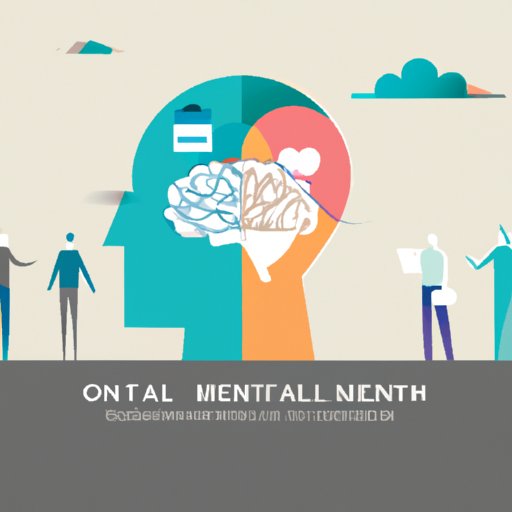Introduction
Mental health evaluations are assessments conducted by mental health professionals to determine the presence of any mental health issues and to assess overall mental health status. An evaluation typically involves a series of questions about symptoms and behaviors that may indicate a mental health disorder. The purpose is to identify any potential mental health issues and to provide treatment recommendations.
Getting a mental health evaluation is important for a number of reasons. It can help to accurately diagnose any mental health issues, provide clarity on the best course of action for managing those issues, and help to reduce feelings of isolation and shame associated with mental health disorders. Knowing that you have access to professional support and resources can be incredibly reassuring and empowering.
Reaching Out to Mental Health Professionals
When it comes to seeking a mental health evaluation, there are a few different types of mental health professionals that you can reach out to. These include psychiatrists, psychologists, social workers, counselors, and therapists. Each type of professional has their own unique qualifications and areas of expertise, so it’s important to do your research to find the right fit for you.
Finding a mental health professional doesn’t have to be difficult. You can start by asking your primary care physician for a referral, or you can search online for qualified professionals in your area. Additionally, many mental health professionals offer free consultations, which can be a great way to get a better understanding of their qualifications and approach to treatment before committing to an evaluation.
Utilizing Online Resources
In addition to reaching out to mental health professionals, there are a number of online resources that can be helpful when it comes to getting a mental health evaluation. There are a variety of mental health screening tools available online that can help to identify any potential mental health issues. In addition, many websites also offer access to online support groups where you can connect with others who are dealing with similar issues.
It’s important to remember that these online resources are not meant to replace professional help. Rather, they can be used as a starting point to gain a better understanding of your mental health and to determine if seeking professional help is the right course of action.

Speaking with Primary Care Physicians
Your primary care physician can be a valuable resource when it comes to getting a mental health evaluation. They can provide referrals to mental health professionals who specialize in the type of care you need and can even provide guidance on the best course of action. Additionally, they can discuss any potential medication options that may be beneficial in treating your mental health issues.
It’s important to remember that your primary care physician is there to help you and that you should feel comfortable discussing any mental health concerns with them. Even if they don’t have direct experience with mental health issues, they can still provide valuable insight and guidance.

Asking Friends and Family for Recommendations
When it comes to getting a mental health evaluation, it can be helpful to seek advice from those close to you. Friends and family members who have had positive experiences with mental health professionals can be a valuable source of information. They can provide firsthand accounts of the types of services provided, the atmosphere of the office, and the overall level of care they received.
It’s important to ask questions when seeking advice from friends and family. Ask them about their experience with the mental health professional and how they felt during their visits. Additionally, ask them if they would recommend the provider to others.
Researching Mental Health Services
Once you’ve identified a few potential mental health professionals, it’s important to do your research. Find out what type of services are offered, such as individual therapy, group therapy, or medication management. Additionally, look into any local resources that may be available, such as support groups or community centers.
It’s also important to remember that cost can be a factor when it comes to mental health services. Make sure to inquire about any fees associated with the services provided and any insurance coverage that may be available.
Contacting Insurance Providers
Finally, it’s important to contact your insurance provider to find out what type of mental health services are covered by your plan. This will allow you to compare prices between different providers and make sure that you’re getting the most value for your money.
Additionally, many insurance providers now offer additional benefits, such as telemedicine services and virtual therapy sessions. These can be a great option for those who are unable to access traditional in-person services or who need more flexibility in their treatment.
Conclusion
Getting a mental health evaluation can be an intimidating and overwhelming process, but it doesn’t have to be. With the right resources and support, it’s possible to make informed decisions and take the necessary steps to improve your mental health. Take the time to research your options and reach out to those close to you for advice and support. You don’t have to go through this alone.
(Note: Is this article not meeting your expectations? Do you have knowledge or insights to share? Unlock new opportunities and expand your reach by joining our authors team. Click Registration to join us and share your expertise with our readers.)
